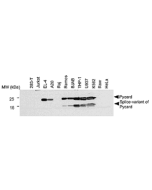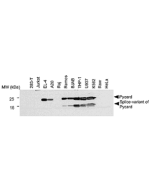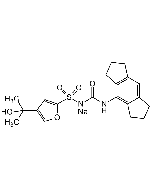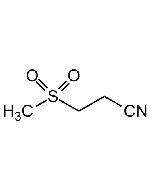Cookie Policy: This site uses cookies to improve your experience. You can find out more about our use of cookies in our Privacy Policy. By continuing to browse this site you agree to our use of cookies.
AdipoGen Life Sciences
anti-Asc, pAb (AL177) (ATTO 647N)
As low as
520
CHF
CHF 520.00
In stock
Only %1 left
AG-25B-0006TS-C100100 µgCHF 520.00

| Product Details | |
|---|---|
| Synonyms | Pycard; Target of Methylation-induced Silencing 1; TMS1; Caspase Recruitment Domain-containing Protein 5; Apoptosis-associated Speck-like Protein Containing CARD; CARD5 |
| Product Type | Polyclonal Antibody |
| Properties | |
| Source/Host | Rabbit |
| Immunogen/Antigen | Synthetic peptide corresponding to aa at the N-terminal human Asc. |
| Label/Conjugates | ATTO 647N |
| Application |
Flow Cytometry (1:1000; Reference 22) The antibody AL177 can be used to measure inflammasome activation in vivo, detecting Asc speck formation by immunofluorescence and Flow Cytometry. |
| Crossreactivity |
Human Mouse |
| Specificity |
Recognizes human and mouse Asc. |
| Purity Detail | Epitope-affinity purified. |
| Concentration | 0.5mg/ml |
| Formulation | Liquid. In PBS containing 0.02% sodium azide. |
| Shipping and Handling | |
| Shipping | BLUE ICE |
| Short Term Storage | +4°C |
| Long Term Storage | +4°C |
| Handling Advice | Do not freeze. |
| Use/Stability |
Keep conjugated formats at +4°C. Stable for at least 1 year after receipt when stored at +4°C. |
| Documents | |
| MSDS |
 Download PDF Download PDF |
| Product Specification Sheet | |
| Datasheet |
 Download PDF Download PDF |
Description
Asc promotes caspase-mediated apoptosis. This proapoptotic activity is mediated predominantly through the activation of caspase-9. It is a component of the inflammasome, a protein complex which also includes NLRP3/NALP3, CARD8 and CASP1 and whose function is the activation of proinflammatory caspases.
Product References
- NALP3 forms an IL-1beta-processing inflammasome with increased activity in Muckle-Wells autoinflammatory disorder: L. Agostini, et al.; Immunity 20, 319 (2004)
- P2X7 Receptor Differentially Couples to Distinct Release Pathways for IL-1beta in Mouse Macrophage: P. Pelegrin, et al.; J. Immunol. 180, 7147 (2008)
- Inflammatory role of ASC in antigen-induced arthritis is independent of caspase-1, NALP-3, and IPAF: L. Kolly, et al.; J. Immunol. 183, 4003 (2009) [IF]
- Activation of autophagy by inflammatory signals limits IL-1b production by targeting ubiquitinated inflammasomes for destruction: C.-S. Shi, et al.; Nat. Immunol. 13, 255 (2012)
- NLRP3 is activated in Alzheimer's disease and contributes to pathology in APP/PS1 mice: M.T. Heneka, et al.; Nature 493, 674 (2013) [IF]
- Measuring inflammasome activation in response to bacterial infection: P. Broz & D.M. Monack; Methods Mol. Biol. 1040, 65 (2013)
- Promyelocytic leukemia protein interacts with the apoptosis-associated speck-like protein to limit inflammasome activation: J.K. Dowling, et al.; J. Biol. Chem. 289, 6429 (2014)
- Localization and functionality of the inflammasome in neutrophils: M. Bakele, et al.; J. Biol. Chem. 289, 5320 (2014)
- The adaptor ASC has extracellular and 'prionoid' activities that propagate inflammation: B.S. Franklin, et al.; Nat. Immunol. 15, 727 (2014) [IF]
- The NLRP3 inflammasome is released as a particulate danger signal that amplifies the inflammatory response: A. Baroja-Mazo, et al.; Nat. Immunol. 15, 738 (2014)
- Aging-associated TNF production primes inflammasome activation and Nlrp3-related metabolic disturbances: F. Bauernfeind, et al.; J. Immunol. 197, 2900 (2016)
- Measuring NLR Oligomerization II: Detection of ASC Speck Formation by Confocal Microscopy and Immunofluorescence: M. Beilharz, et al.; Methods Mol. Biol. 1417, 145 (2016)
- Cell-Free Assay for Inflammasome Activation: Y. Jamilloux & F. Martinon; Methods Mol. Biol. 1417, 207 (2016)
- The inflammasome pathway in stable COPD and acute exacerbations: R. Faner, et al.; ERJ Open Res. 2, 00002-2016 (2016) [IF]
- A single domain antibody fragment that recognizes the adaptor ASC defines the role of ASC domains in inflammasome assembly: F.I. Schmidt, et al.; J. Exp. Med. 213, 771 (2016) [IF]
- Distinct surveillance pathway for immunopathology during acute infection via autophagy and SR-BI: S. Pfeiler, et al.; Sci. Rep. 6, 34440 (2016) [IF, specific for ATTO647N]
- Microglia-derived ASC specks cross-seed amyloid-β in Alzheimer's disease: C. Venegas, et al.; Nature 552, 355 (2017) [IF]
- The IL-1/IL-1 receptor axis and tumor cell released inflammasome adaptor ASC are key regulators of TSLP secretion by cancer associated fibroblasts in pancreatic cancer: E. Brunetto, et al.; J. Immunother. Cancer 7, 45 (2019) [IF]
- NLRP3 inflammasome activation drives tau pathology: C. Ising, et al.; Nature 575, 669 (2019) [IF]
- Inflammasome assays in vitro and in mouse models: H. Guo & J.P.Y. Ting; Curr. Protoc. Immunol. 131, e107 (2020)
- Human NLRP1 is a sensor for double-stranded RNA: S. Bauernfried, et al.; Science 371, 482 (2021)
- DDX3X coordinates host defense against influenza virus by activating the NLRP3 inflammasome and type I interferon response: S. Kesavardhana, et al.; J. Biol. Chem. 296, 100579 (2021)
- Instructions for Flow Cytometric Detection of ASC Specks as a Readout of Inflammasome Activation in Human Blood: N. Wittmann, et al.; Cells 10, 2880 (2021) [Flow Cytometry]
- Oxidized DNA fragments exit mitochondria via mPTP- and VDAC-dependent channels to activate NLRP3 inflammasome and interferon signaling: H. Xian, et al.; Immunity 55, 1370 (2022)
- Protocol to measure apoptosis-associated speck-like protein containing a CARD specks in human cerebrospinal fluid via imaging flow cytometry: K.E. Sanchez, et al.; STAR Protoc. 5, 102916 (2024) [Flow Cytometry]
- Acute suppression of mitochondrial ATP production prevents apoptosis and provides an essential signal for NLRP3 inflammasome activation: B.S. Saller, et al.; Immunity 58, 90 (2025)










